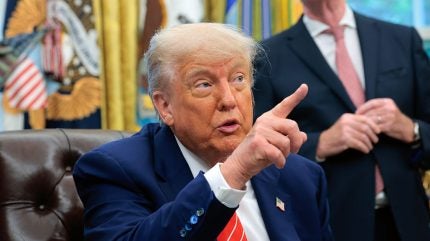
In a renewed push to overhaul pharmaceutical pricing in the US, President Donald Trump announced he will sign an executive order to link US drug prices to those paid in other countries.
The executive action, posted late Sunday 12 May on Trump’s Truth Social platform, outlines a “most favoured nation” pricing model under which the US government would not pay more for drugs than the lowest price charged globally. Trump claimed the measure would lead to immediate reductions in prescription drug costs, ranging from 30% to 80%, although no implementation details or timelines were provided.

Discover B2B Marketing That Performs
Combine business intelligence and editorial excellence to reach engaged professionals across 36 leading media platforms.
Drug prices are typically highest in the US. According to a Reuters article, pharma companies launched new US drugs at prices 35% higher in 2023 compared to those launched in 2022.
Trump said it is “difficult to explain and very embarrassing” why drugs in the US are priced higher compared with other nations. He criticised pharmaceutical companies for shifting the burden of research and development (R&D) costs onto American consumers, stating that “the suckers of America” had been paying disproportionately for years.
The new order is expected to apply to certain federal healthcare programmes, though it is still unclear whether it will target Medicare Part B, Medicare Part D, Medicaid, or another segment of government drug spending. Trump claimed the order could save the federal government “trillions of dollars”.
The pharmaceutical sector has historically resisted the “most favoured nation” approach, warning it could reduce global R&D investment and lead to supply disruptions. Trump’s previous attempt to introduce the policy in 2020 aimed to peg Medicare Part B reimbursement rates to prices paid in a select group of developed countries. That rule was ultimately invalidated by a federal judge and rescinded under President Joe Biden.

US Tariffs are shifting - will you react or anticipate?
Don’t let policy changes catch you off guard. Stay proactive with real-time data and expert analysis.
By GlobalDataSince returning to office in January 2025, Trump has signed several executive orders focused on pharmaceutical pricing and manufacturing. In April, he issued an order instructing the Department of Health and Human Services (HHS), led by Secretary Robert F Kennedy Jr, to recommend reforms to the Inflation Reduction Act’s Medicare Drug Price Negotiation Program. That order also sought to streamline the approval of generics and biosimilars by the US Food and Drug Administration (FDA) and remove what Trump called the “pill penalty” that favoured biologics over small molecule drugs.
Last week, Trump signed a separate order aimed at strengthening domestic pharmaceutical manufacturing. That policy is aimed at closing what the agency describes as a regulatory gap, ensuring foreign drug manufacturing plants receive the same level of scrutiny and surprise inspections as US-based facilities.
In a related move, the administration has initiated Section 232 national security investigations into pharmaceutical imports, laying the groundwork for potential tariffs on foreign-made drugs and active pharmaceutical ingredients.




